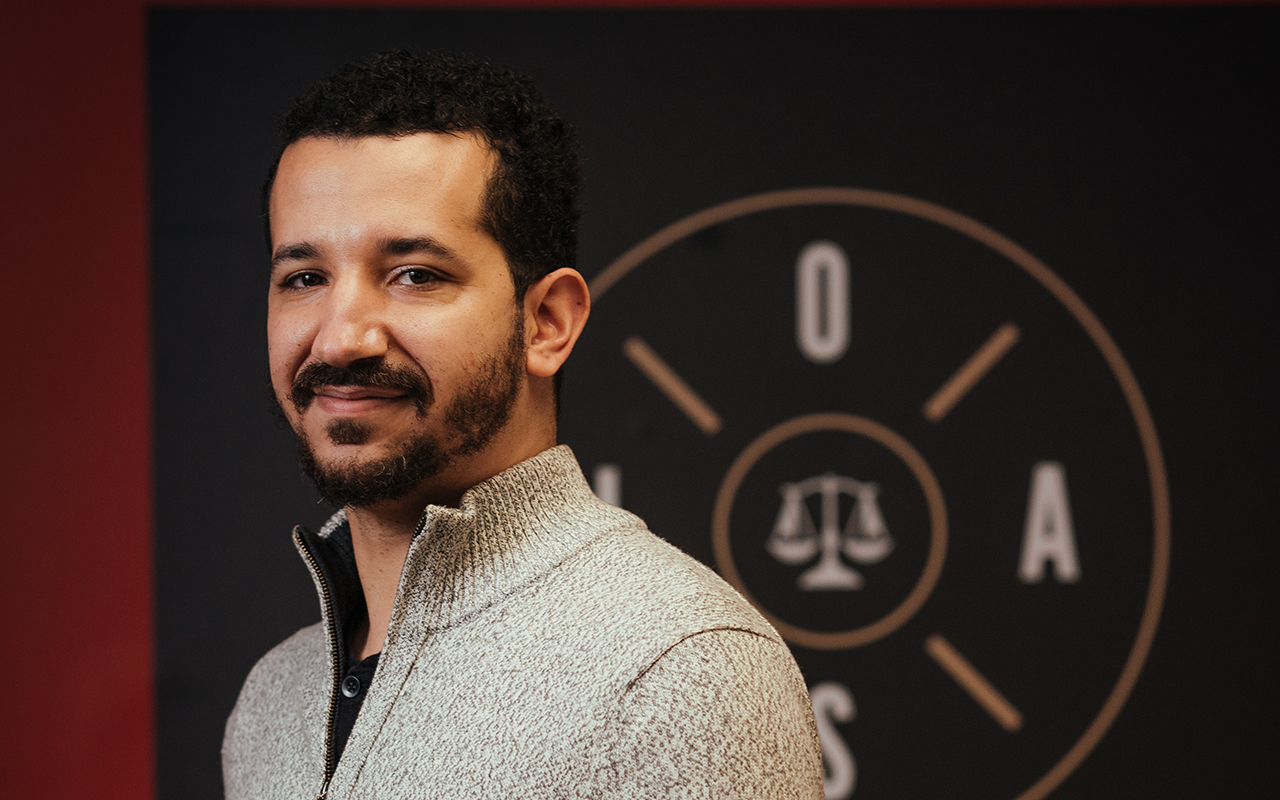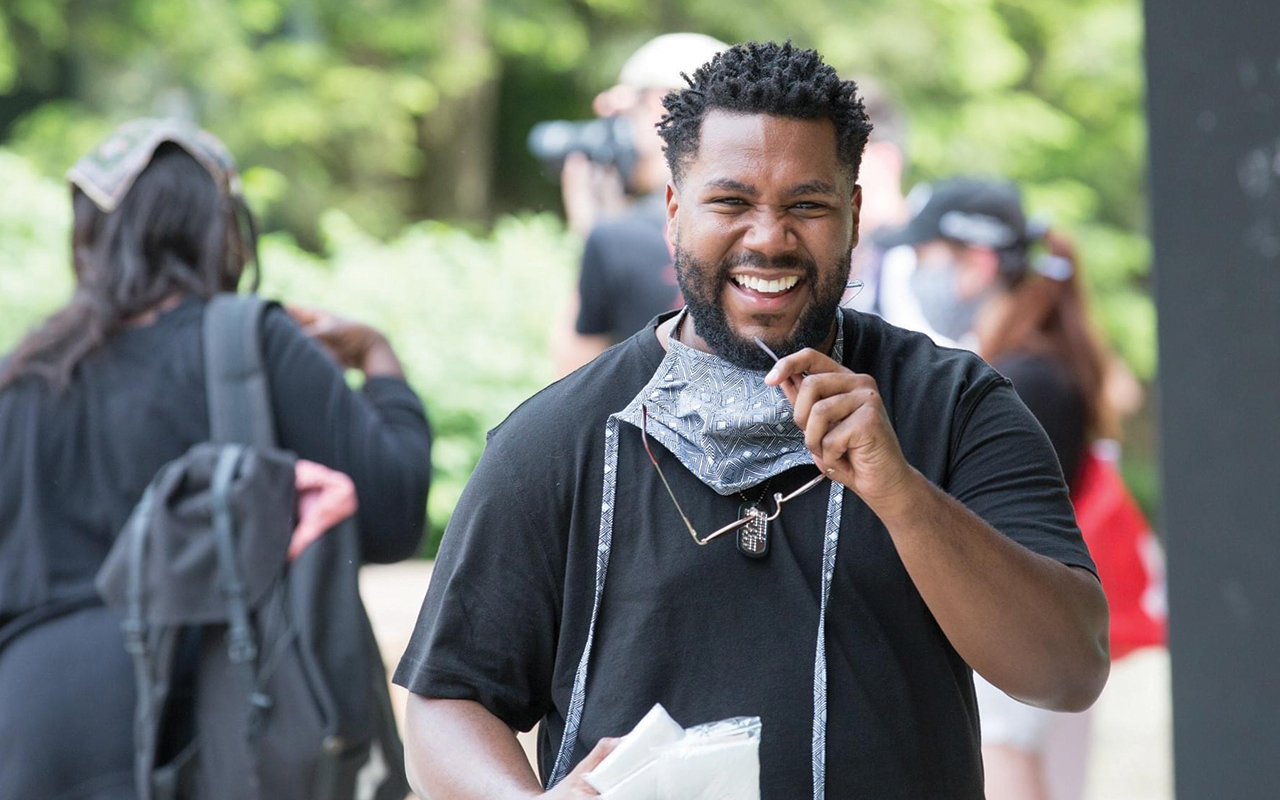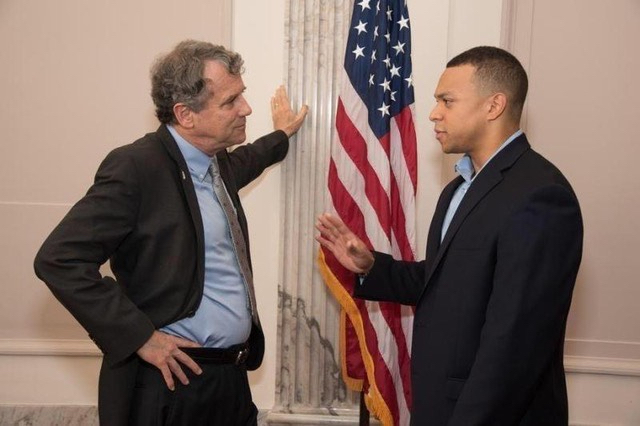James Prysock ’09, MBA’19, director of Otterbein’s Office of Social Justice and Activism, connected with Otterbein graduate, Tony Bishop ’15, MSAH’18, the new executive director of the Ohio Legislative Black Caucus, and Desmond Fernandez ’21, a senior BFA acting major who organized several Westerville-based Black Lives Matter protests this summer. During their conversation, Bishop and Fernandez shared their insights and hopes for how working together can enable change.

PRYSOCK: Part of advocacy is doing some things you don’t necessarily have to do, but it’s something that you really want to do. Why did you feel it was so important to be a part of the leadership of the Westerville protest, Desmond?

Desmond Fernandez ’21 said this is his time to be a part of bettering his community.
FERNANDEZ: I’ve been a part of this community for so long — it’s my lifeline for success and happiness. This is my time to be a part of this mission to better our community and make it even more diverse and more inclusive.
What I thought was going to be maybe 50 people was almost 1,000 people. It was inspiring. Not only was I protesting with my classmates, I was protesting with my teachers. Teachers who exposed me to morals and lessons from To Kill a Mockingbird; who helped mold my belief that black people do have a purpose in theatre; who were there photographing everything to make sure it leaves an imprint on our history — and one professor even brought her son. What this is about is deeply ingrained in my community … Westerville is going to be an example by the time we get done with this.
PRYSOCK: What specific changes would you like to see to be an inclusive community?
BISHOP: Community is the way through all of this. These protests are everybody — young, old, black, white and everybody in between. That’s the beautiful thing about it. This is our opportunity right now to redefine what it means to be an American and say that is an inclusive thing. The reason we are so strong as a country, historically, is because of our diversity. The only substantive pillar of American exceptionalism is the fact that we’re all in it together. We have the best minds from all over the world under one roof. I’d like to see people rally around that.
FERNANDEZ: For me, it’s unity. If we get stuck in these debates of each side saying, “I’m not going to budge,” we’re going to remain stagnant. We’ve got to be able to find that middle ground. We’ve got to come together. Then, as we begin to understand one another, what is the next action going to be? We’ve got to hold those that are in a higher position than us accountable. We’ve got to know who to contact — whether that’s in Congress or local legislators. Voting is a powerful thing. Voting is not the cure — it is simply a tool. We’ve got to do other things as well.
PRYSOCK: Tony, you passed on one opportunity in order to work for the Black Caucus. What compelled you? (Bishop was invited as the United States’ representative to the Foreign Service program at the University of Oxford, England.)
BISHOP: If something happens to this place and I was somewhere else and I wasn’t doing my part — protesting, helping out legislatively — I don’t think I could live with myself. This country is everything to me despite its flaws and warts … we believe so much in this place that we’re honestly willing to die for it.
Also, when you do the right thing, good things normally come back to you. I got invited to speak in the U.K. about what I’m doing now. It all comes full circle when you do what you’re supposed to do.
Otterbein instilled that in us — making those values basically a part of the core curriculum. Otterbein has a history of doing what’s right before it’s popular and not being afraid to stand out there as the first one. That level of sacrifice is necessary to change something.
PRYSOCK: What advice would you give to people who want to be advocates and are trying to figure out the way to best support their community?
FERNANDEZ: Alice Walker. Rosa Parks. Martin Luther King Jr. Malcolm X. Maya Angelou. John Lewis. Colin Kaepernick. These are absolutely profound people, and they made a huge impact on our American culture. But they’re just humans. You don’t need to give speeches in front of thousands of people or have all the press there to be an advocate. These people were advocates but they’re also activists. Like the first part of that word, you simply need to act. You’ve got to do it and you’ve got to act now.
BISHOP: The best way to formulate changes to a system is to learn how it works in the first place so you know you can rebuild it better. I’ll give you a quote from the movement: “We are the ones we’ve been waiting for.” Everybody has a part to play. There’s a way to raise awareness about what’s happening and show where you stand. Whatever your strengths are — volunteering your time or baking cookies or whatever — there’s a place in this for everybody.

